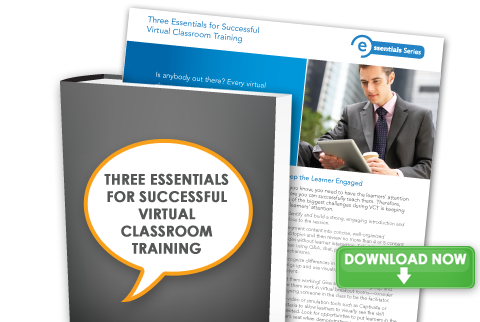Virtual learning makes sense for many industries today, including the pharmaceutical industry. Many businesses are geographically spread out, and bringing everyone together for training can be expensive and disruptive. Virtual instructor-led training is becoming more popular not only because of monetary and time savings, but also because it can be conveniently scheduled and can leverage technology in new, exciting, effective ways.
Virtual learning isn’t a novelty, but we’re still learning how to best translate instructor-led learning from the physical classroom to the virtual classroom. The virtual trainer who is terrific in the traditional classroom setting can’t assume he or she will automatically be as effective in a virtual classroom. Here are some tips for becoming a better virtual trainer.
Don’t Forget Basic Instructional Design Principles
The fundamental instructional design principles that apply in the regular classroom also apply in the virtual classroom, but they are delivered differently. First, you must answer the learners’ primary question: “What’s in it for me?” when you introduce a lesson. Conveying learning objectives and informing participants about how and when they will be evaluated are other critical tasks. If you can build upon previous knowledge, do so, and if you’re not sure of learners’ knowledge, consider having a pretest so you can have an idea where each learner is starting from.
Make the Virtual Classroom Welcoming and Friendly
Making a virtual classroom welcoming and friendly obviously requires different steps than making a physical classroom welcoming. Text and tone of voice become increasingly important, and you should encourage your learners to use feedback tools (or even cues like emoticons) during learning sessions. Share a little about yourself as a person and encourage your students to share lessons they have learned that are relevant to the material. When you ask questions, make them specific. For example, “When might you reference this clinical study in the field?” will be a more productive question than, “What do you think?”
Organize Lessons but Switch Up Learning Modalities
Maintaining the attention of your learners in a virtual environment can be challenging. Therefore, it’s imperative that lessons themselves be well organized and divided up into digestible, “snack sized” learning modules. With lessons well-planned and organized, you can focus on ensuring students participate. You don’t want to go for long without interaction with learners. Use the technology available, such as chat, polling, and audio to encourage feedback. Since your students will likely have different learning styles, be sure to mix things up between visual, audio, text, and exercises. This will ensure all students encounter their preferred learning style and stave off boredom.
Virtual Instructor-Led Training Should Be Compact
With a captive audience in a physical classroom without all the distractions that abound in a virtual learning environment, longer learning sessions make more sense. But in a virtual environment, learning sessions generally should be shorter. A two-hour lecture that may work in a regular classroom may need to be remade into two hour-long lessons for the virtual classroom. When students can complete assignments offline, there’s no real need to keep everyone together in the virtual classroom. Better to break off into virtual groups, or work offline and reconvene later to go over the assignments.
Be a Facilitator Rather Than a Lecturer
When pharma sales training takes place in a virtual classroom the “lecturer” is actually more of a facilitator. The “I lecture; you listen” model simply doesn’t translate well to the virtual classroom. Virtual learning allows breakout spaces, chat, and virtual whiteboards, and you should use them to keep everyone on point and interacting. You can even use a quick online poll occasionally to determine where a lesson should go or whether any topics should be revisited.
Encourage your students to interact with you and with each other, and make sure they know they’re welcome to share their experiences or relevant knowledge. We encourage you to get in touch with us at any time if you have questions or to explore our areas of training expertise.





